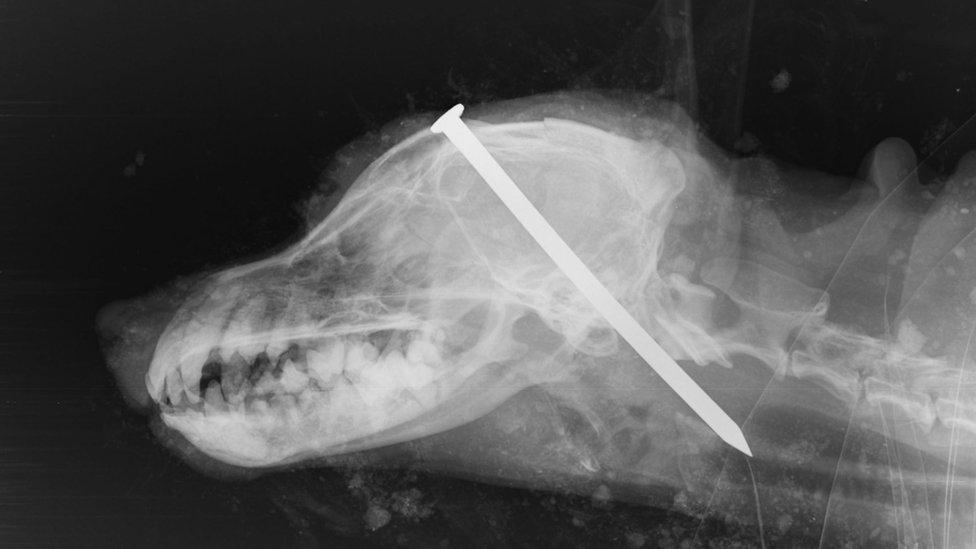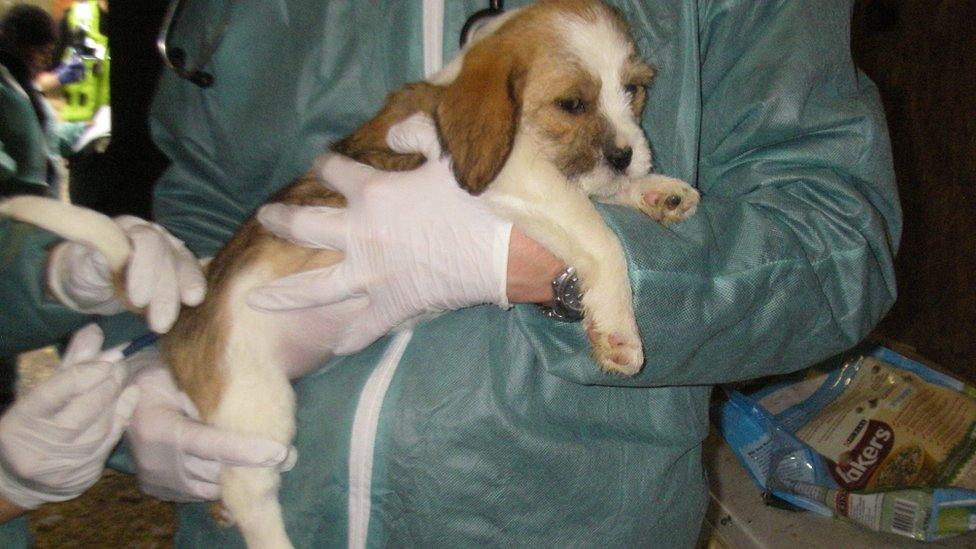Are we tough enough on animal cruelty?
- Published

Andrew Frankish was filmed stamping on a bulldog and throwing her down stairs
When two brothers who filmed themselves torturing a dog were spared jail it provoked an outcry. Yet England and Wales has the lightest maximum sentence in Europe for animal cruelty offences. Now an MP is hoping to make the law tougher on perpetrators.
There was outrage when the abuse to which Andrew and Daniel Frankish subjected a bulldog became public knowledge.
The brothers, from Redcar in Teesside, had repeatedly stamped on the dog and thrown it down stairs. As a result the dog became paralysed in the back legs and was eventually put down.
Yet they were given only a suspended sentence at Hartlepool Magistrates Court. Even if they had been jailed, the maximum prison sentence they could have faced was six months - meaning they would be released in just three.
The sentence attracted widespread criticism. Nearly 500,000 people signed an online petition, external calling for a tougher penalty. Others held a vigil for the abused dog while a plane was flown over Middlesbrough FC's stadium during a match, calling for the brothers to be locked up.
Redcar's Labour MP Anna Turley, who was among those outraged by the sentence, has secured a parliamentary debate about the issue later on Friday.
Between 2013 and 2015 more than 3,000 people in England and Wales were convicted of animal cruelty but just 7% received jail terms.
Currently sentences in England and Wales are the lowest in Europe. In France the maximum is two years and in Germany it is three.
Ms Turley's Animal Cruelty (Sentencing) Bill - which will have its second reading on Friday - would increase the maximum to five years, matching the current situation in Northern Ireland.

This dog was nailed in the head and buried alive. It had to be put down
"The current sentences available to courts to punish animal abuse are not working," she says. "They often mean the perpetrators of cruel acts towards animals just receive a slap on the wrist.
"If we do not properly punish these people then as a society we are essentially legitimising abuse against animals".
She reiterated her stance when another pair of her constituents admitted hammering a nail into a dog's head and burying it alive in what a court heard was "the worst case" a vet had ever seen.
Claire Horton, chief executive of Battersea Dogs' and Cats' Home, said the sentences for animal cruelty were too gentle.
"Six months in prison for the gravest act of animal cruelty, such as torturing an animal to death, is a fraction of the maximum sentence for fly tipping [five years] or theft [seven years]," she said.
"So let's get this into proportion and let the punishment for abusing animals truly fit the crime."
The current sentencing guidelines have not changed since the Protection of Animals Act 1911. The Act was introduced essentially to make it an offence to override or overload animals pulling loads on the street.
The Animal Welfare Act 2006 actually made provision to increase sentencing to 51 weeks, but the provision was never enacted.

Animal cruelty sentences

Puppies were rescued from a farm in Solihull
Puppy farmer Sean Kerr, from Solihull, was jailed for six months after being found guilty of causing unnecessary suffering to more than 30 dogs in the West Midlands. Puppies lived on floors coated with faeces and their bedding was soaked with urine
In December Christopher and Adam Hoar were jailed for six weeks for kicking a hedgehog to death at Dalton Park retail centre in Murton, County Durham. The offence, recorded on CCTV, was described as "horrible" by the judge
Kieran Milledge was jailed for 21 weeks in November after he swung his Staffordshire bull terrier, Ronnie, against a train's wall and pushed his foot in the dog's face
John Wilcock and Bernadette Nunney were given suspended sentences and banned from keeping animals for life in November for leaving dozens of dogs in squalid conditions at a farm in Bradford, West Yorkshire
Jennifer Lampe received a four-month suspended sentence in August after she drunkenly decapitated her two snakes with scissors before swallowing their heads at her home in Market Drayton, Shropshire
Gary Samuel from Enfield was given a suspended 12-week prison sentence in March 2016 after police found dogs locked in cages in a filthy "pitch-black dungeon" at Armley Vets in Leeds, West Yorkshire

The RSPCA is firmly behind the idea that sentences should be tougher.
Its chief veterinary officer James Yeates says people are not only being deliberately cruel, but "in disturbingly inventive ways."
There have been five prosecutions relating to the "Neknomination" online craze in which people took part in "dares" involving swallowing live fish, frogs and even a lizard.
In Gloucestershire a man was jailed for 16 weeks for microwaving a rabbit to death because he "was angry". Paul Rogers said he had "no remorse whatsoever. Not even a grain of sand on a beach. I would be lying if I said I did."

Dozens of dogs were found in squalid conditions at a farm in Bradford, including dead puppies in a wheelbarrow
The RSPCA has highlighted several "shocking" cases, including that of a man who stabbed his dog and then hid her behind the washing machine. He was jailed for 12 weeks.
There are wider issues too. There is a substantial body of evidence that animal cruelty offenders also commit other serious crimes. A study carried out on behalf of the NSPCC found the children of pet abusers were more at risk of neglect or abuse themselves, external.
The charity says professionals "can no longer afford to ignore the potential links between child abuse and animal cruelty. The two forms of abuse should not be seen as mutually exclusive; it needs to be recognised that they can co-exist, or there may be associations between the two".
League Against Cruel Sports chief executive Eduardo Goncalves added: "If we don't offer a serious punishment to animal abusers then they will continue abusing animals.
"I spend a lot of my time looking at horrific dog fighting footage as the League is working hard to stamp this out in the UK, but I know in the back of my mind that if we catch a dog fighter, the most they will get is six months in prison - and probably much less.
"That's utterly inadequate and would be laughable if it wasn't so shocking."
When discussing the five-year proposal in November, the Parliamentary Under-Secretary of State for Justice, Sam Gyimah, pointed out that the average custodial sentence for animal cruelty was about three and a half months.
"If judges are not going up to the maximum six months, there is a question whether the issue is with the maximum sentence length or the courts are finding the current sentencing powers inadequate or restrictive in dealing with those cases. We have to look at that.
"The maximum penalty for animal cruelty offences is under review."
- Published22 February 2017

- Published1 April 2016
